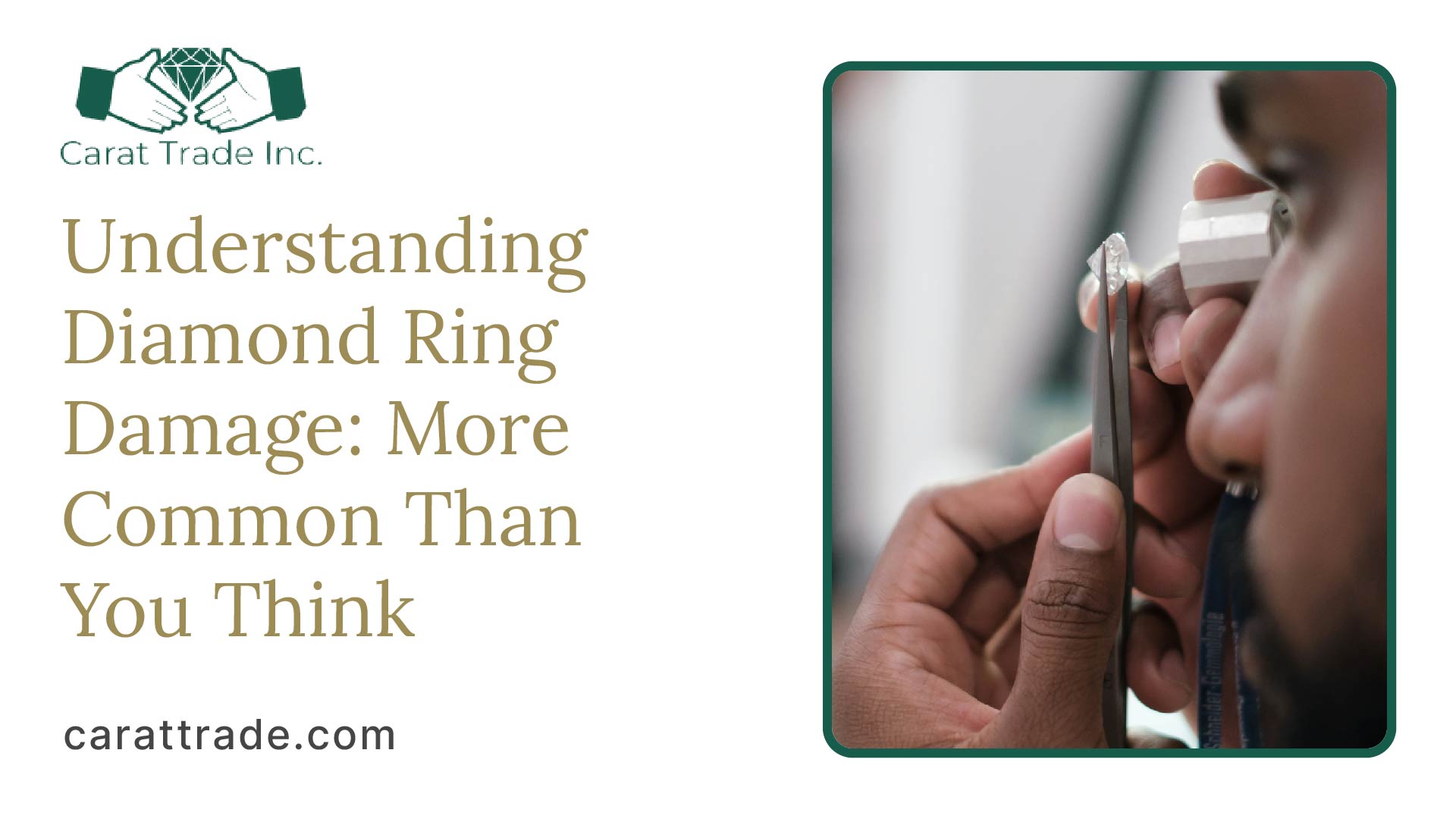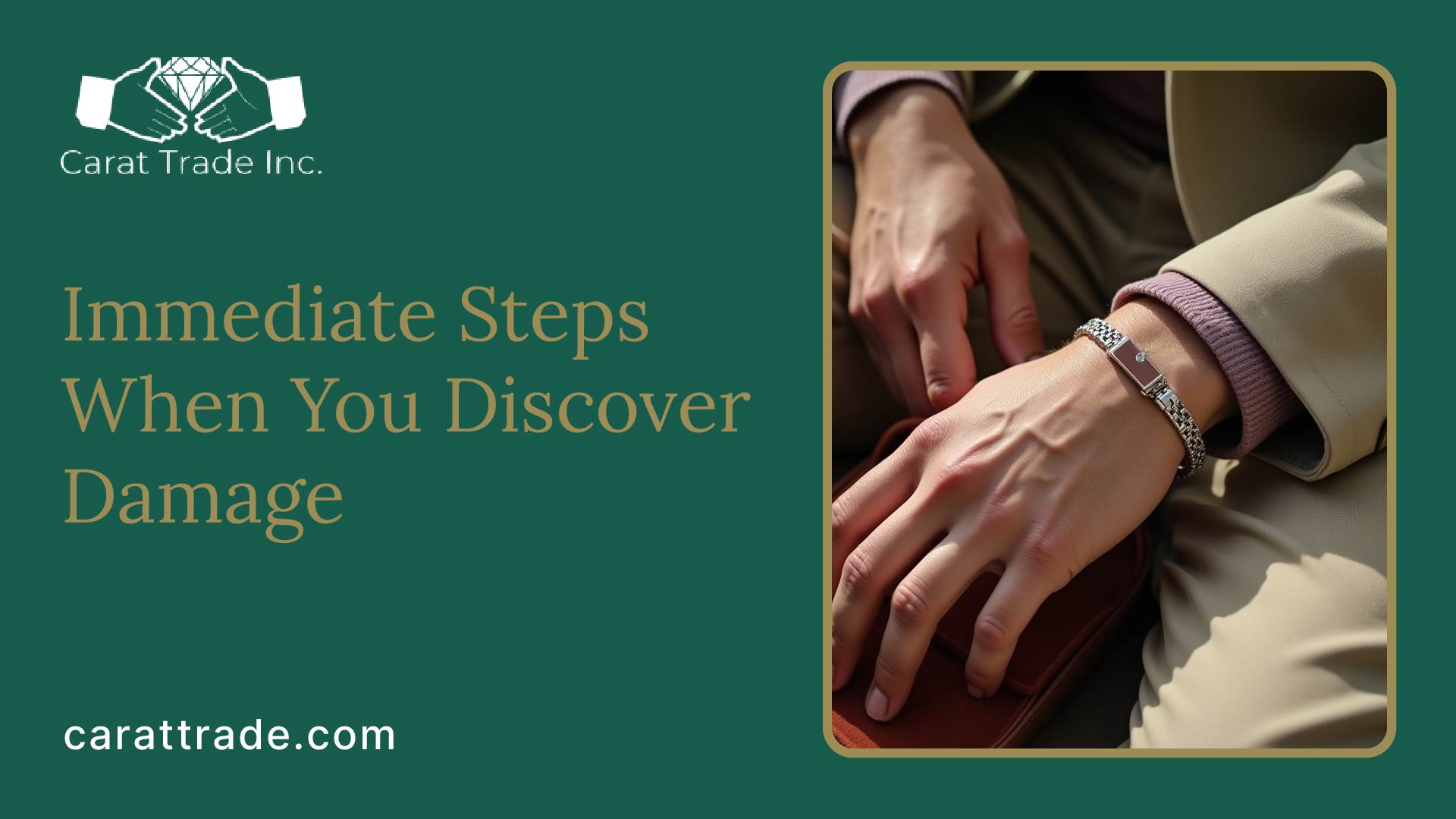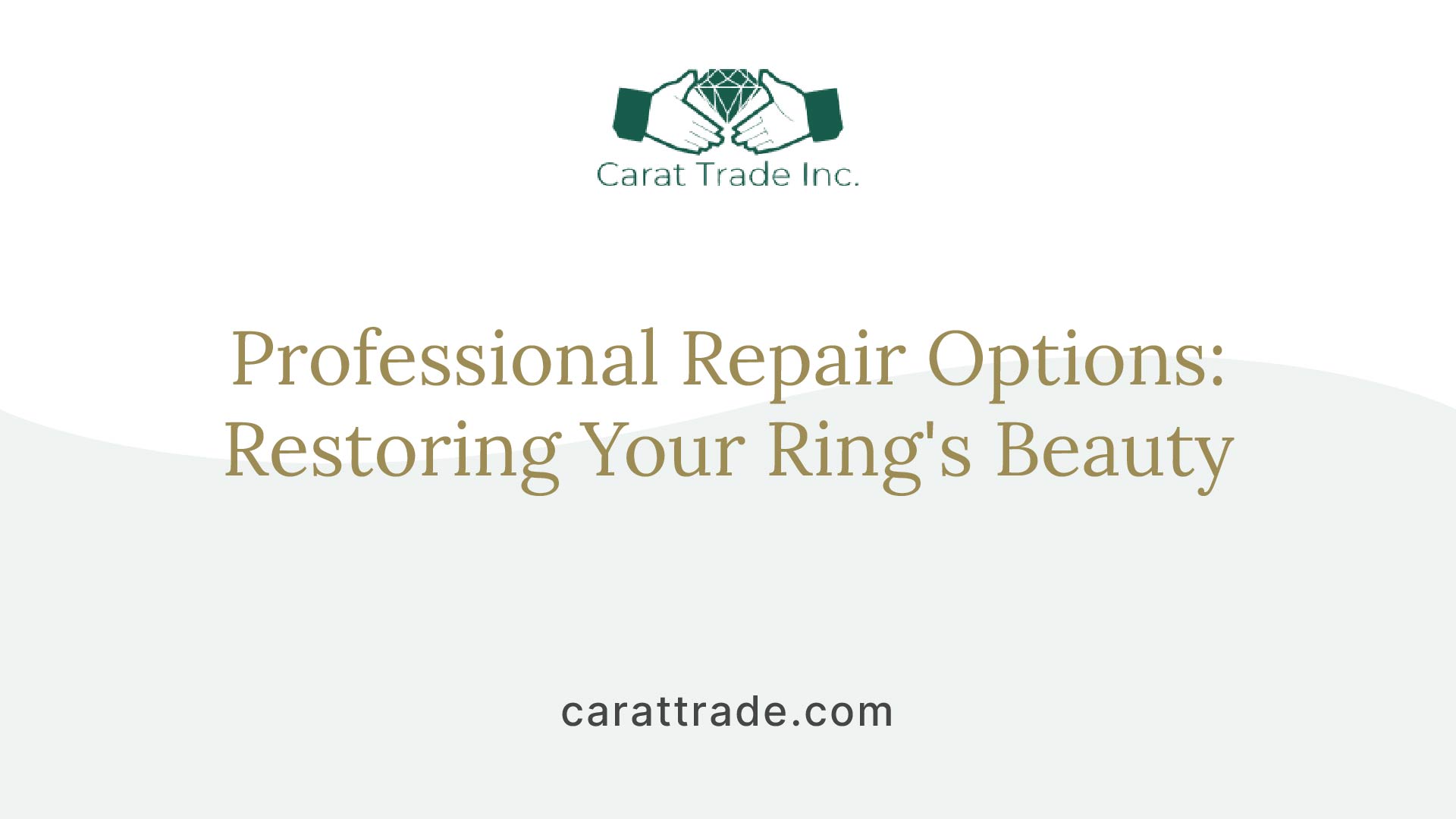What to Do with a Broken or Damaged Diamond Ring

Discovering damage to your precious diamond ring can be heartbreaking, but it doesn't have to mean the end of your treasured jewelry. Whether it's a chipped stone, bent prong, or completely broken band, there are numerous options to restore, repurpose, or reimagine your damaged diamond ring.

Understanding Diamond Ring Damage: More Common Than You Think
Diamond rings face daily wear and tear, making damage surprisingly common. According to jewelry industry surveys, approximately 23% of engagement rings require professional repair within the first five years of ownership. Understanding the types of damage and your options can help you make the best decision for your specific situation.
Common Types of Diamond Ring Damage
- Prong Damage: The most frequent issue affecting diamond rings involves damaged or worn prongs. These small metal claws hold your diamond securely in place, but daily activities can cause them to bend, break, or wear thin over time. Loose prongs account for nearly 40% of all diamond ring repairs, according to professional jewelers.
- Chipped or Cracked Diamonds: While diamonds are the hardest natural substance (rating 10 on the Mohs scale), they can still chip or crack, especially along their cleavage planes. Impact damage typically occurs when rings are dropped on hard surfaces or struck against objects during daily activities.
- Band Breaks and Cracks: Metal fatigue, especially in thinner bands or vintage pieces, can lead to breaks or cracks in the ring's structure. This is particularly common in rings that are frequently resized or those made from softer metals like gold.
- Stone Loss: Complete stone loss occurs when prong damage goes unnoticed, allowing the diamond to fall out entirely. Jewelry insurance claims data shows that stone loss represents approximately 15% of all diamond ring insurance claims.

Immediate Steps When You Discover Damage
1. Assess the Damage Safely
Before handling a damaged ring extensively, examine it carefully under good lighting. If the diamond appears loose, avoid wearing the ring to prevent stone loss. Use a magnifying glass if available to better understand the extent of the damage.
2. Secure Loose Stones
If your diamond is loose but still present, place it in a small, secure container. Even tiny diamond chips have value and can sometimes be incorporated into repair work or alternative jewelry pieces.
3. Document the Damage
Take clear photographs of the damage from multiple angles. This documentation will be valuable for insurance claims and when consulting with jewelers about repair options.
4. Contact Your Insurance Provider
If you have jewelry insurance, contact your provider immediately. Many policies cover accidental damage, and prompt notification is often required for claims processing.

Professional Repair Options: Restoring Your Ring's Beauty
Prong Repair and Retipping
Prong repair is often the most straightforward and cost-effective solution for damaged diamond rings. Professional jewelers can:
- Retip worn prongs: Adding new metal to prong ends costs typically $15-30 per prong
- Rebuild damaged prongs: Complete prong reconstruction ranges from $40-80 per prong
- Replace entire head settings: When multiple prongs are damaged, replacing the entire setting may be more economical
The process usually takes 1-2 weeks and maintains your ring's original appearance while securing your diamond properly.
Diamond Replacement and Matching
When diamonds are chipped, cracked, or lost entirely, replacement becomes necessary. Modern gemological technology allows jewelers to:
- Match diamond characteristics: Color, clarity, cut, and carat weight matching ensures seamless replacement
- Source certified stones: Reputable jewelers provide GIA or other certification for replacement diamonds
- Incorporate existing stones: Undamaged diamonds from your ring can be incorporated into new designs
Band Repair and Reconstruction
Metal band repairs vary in complexity and cost:
- Simple crack repair: Laser welding small cracks costs $50-150
- Shank replacement: Replacing worn or damaged portions costs $200-500
- Complete reconstruction: Severely damaged rings may require complete band recreation ($300-800)
Restoration vs. Replacement Costs
Industry data suggests that professional restoration costs typically range from 20-60% of a ring's replacement value, making repair often more economical than replacement.
Creative Repurposing Ideas: Giving New Life to Damaged Rings
Transform into Different Jewelry Pieces
Pendant ConversionConverting your diamond ring into a pendant preserves its sentimental value while creating wearable jewelry. This option works particularly well when:
- Band damage is extensive but the stone and setting remain intact
- Ring size changes make wearing impossible
- Personal style preferences shift toward necklaces
Earring CreationIf you have multiple damaged rings or additional diamonds, creating matching earrings provides an elegant solution. Single diamond earrings have increased in popularity, with searches for "single diamond earrings" increasing by 34% over the past two years.
Bracelet IntegrationIncorporating diamond elements into charm bracelets or tennis bracelets creates meaningful, wearable pieces that honor the original ring's significance.
Modern Ring Redesign Options
Contemporary SettingsModern jewelry design offers numerous alternatives to traditional settings:
- Bezel settings: Provide maximum protection for previously damaged stones
- Tension settings: Create dramatic, modern appearances
- Cluster designs: Incorporate diamond chips or smaller stones from damaged pieces
Mixed Metal DesignsCombining different metals can incorporate salvaged elements while creating contemporary aesthetics. Rose gold, white gold, and platinum combinations are particularly popular in current jewelry trends.
DIY Maintenance and Temporary Solutions
Safe Temporary Fixes
While professional repair is recommended, some temporary measures can prevent further damage:
Prong Protection
- Use clear nail polish on slightly loose prongs as a temporary measure
- Avoid activities that might snag or impact the ring
- Store the ring in a protective jewelry box when not wearing
Loose Stone Security
- Place a small piece of tape over loose stones (avoid adhesive contact with the diamond)
- Remove the ring during physical activities
- Check stone security regularly by gently tapping the ring
What NOT to Attempt at Home
Certain repairs should never be attempted without professional expertise:
- Prong tightening: Improper technique can damage both stone and setting
- Stone setting: Requires specialized tools and expertise
- Metal soldering: Home soldering often causes more damage than the original problem
Cost Analysis: Repair vs. Replace vs. Repurpose
Financial Considerations
Making the right choice often depends on financial factors:
Repair Costs by Damage Type:
- Prong retipping: $15-30 per prong
- Stone replacement: $200-2,000+ depending on diamond quality
- Band repair: $50-500 depending on complexity
- Complete restoration: $300-1,500 for comprehensive repairs
Repurposing Costs:
- Pendant conversion: $150-400
- Earring creation: $200-600 for the pair
- Ring redesign: $400-1,200 depending on complexity
Insurance Considerations
Jewelry insurance policies vary significantly in coverage:
- Replacement cost policies: Cover full replacement value but may require specific jewelers
- Agreed value policies: Provide predetermined amounts but may not reflect current market values
- Actual cash value policies: Factor in depreciation, potentially limiting repair options
Research indicates that only 32% of engagement ring owners carry specific jewelry insurance, despite the average engagement ring value of $5,500.
Emotional and Sentimental Value Considerations
Preserving Memories
For many people, diamond rings carry irreplaceable emotional significance. Consider these factors when making decisions:
Original vs. Modified Value
- Some prefer maintaining original designs to preserve memories
- Others find meaning in transformation, symbolizing life changes or growth
- Family heirloom considerations may influence decision-making
Future Generations
- Restored rings can be passed down as originally intended
- Repurposed pieces may be more practical for future recipients
- Documentation of transformation stories adds sentimental value
Symbolic Transformations
Ring damage and subsequent repair or repurposing can symbolize:
- Resilience: Overcoming challenges and emerging stronger
- Adaptation: Adjusting to life changes while maintaining core values
- Renewal: Creating new chapters while honoring the past
Finding the Right Professional
Choosing a Qualified Jeweler
Selecting the right professional is crucial for successful repair or repurposing:
Certification and Training
- Look for GIA (Gemological Institute of America) certification
- American Gem Society membership indicates professional standards
- Local jewelry association membership demonstrates community involvement
Experience and Specialization
- Ask about experience with your specific type of damage
- Request examples of similar repair work
- Inquire about warranty policies for repair work
Communication and Transparency
- Quality jewelers provide detailed explanations of proposed work
- Written estimates should include labor, materials, and timeline
- Progress updates during complex repairs demonstrate professionalism
Red Flags to Avoid
- Pressure to make immediate decisions
- Unwillingness to provide written estimates
- Lack of proper insurance for customer jewelry
- No physical store location or established business presence
Prevention: Protecting Your Investment
Daily Care Practices
Implementing proper care routines can prevent future damage:
Regular Inspections
- Check prong security monthly
- Look for signs of metal wear or stone movement
- Professional inspections every 6-12 months catch problems early
Activity Modifications
- Remove rings during high-impact activities
- Avoid exposing rings to harsh chemicals
- Store jewelry properly when not wearing
Professional Maintenance
- Annual cleaning and inspection services cost $50-100
- Preventive prong retipping every 3-5 years prevents major repairs
- Professional cleaning maintains ring appearance and allows damage detection
Insurance and Documentation
- Maintain updated appraisals every 3-5 years
- Keep detailed photographs and documentation
- Understand your policy coverage and limitations
- Consider scheduled jewelry coverage for valuable pieces
Making Your Decision: A Framework for Choice
Evaluation Criteria
Consider these factors when deciding how to handle your damaged diamond ring:
- Extent of damage: Minor repairs vs. major reconstruction needs
- Financial considerations: Repair costs vs. replacement vs. repurpose expenses
- Sentimental value: Importance of maintaining original form vs. accepting transformation
- Lifestyle factors: How you wear and use jewelry daily
- Future plans: Long-term ownership vs. potential gifting or inheritance
Decision Matrix
Create a simple comparison:
- Repair: Maintains original design, potentially most economical, preserves historical accuracy
- Replace: Modern options, warranty coverage, potentially higher cost
- Repurpose: Creative solutions, maintains sentimental elements, unique results
Conclusion
A broken or damaged diamond ring doesn't represent an ending—it's an opportunity for a new beginning. Whether you choose professional restoration, creative repurposing, or modern replacement, your decision should align with your personal values, financial situation, and emotional connection to the piece.
The key lies in taking prompt action to prevent further damage, consulting with qualified professionals, and carefully considering all available options. With proper care and decision-making, your damaged diamond ring can continue bringing joy and meaning to your life, whether in its original form or transformed into something entirely new.
Remember that the true value of diamond jewelry extends beyond monetary worth. The memories, emotions, and personal significance embedded in these pieces make them irreplaceable treasures worthy of thoughtful consideration and care.
References:
Contact Us
Get a Quote for Jewelry
Get a quote to sell or custom create any piece of jewelry just by uploading a photo/link to a piece.
.png)
.svg)
